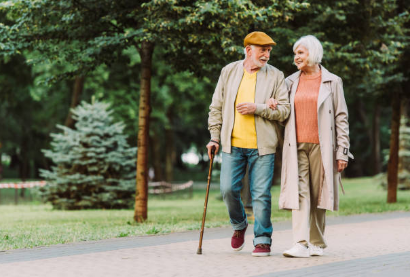At Cane Masters, we make sturdy, dependable, reliable, and handsome walking canes. We are always looking for ways to craft stronger canes without adding unnecessary weight. A cane that is too heavy limits your maneuverability. At the same time, one that is too light lacks the density necessary for strength and durability. We craft our canes to balance between the two.
As an engineer by training (apologies to non-geeks), there is a scientific method to measure and compare species of wood. Density (weight of the wood a specific volume) is a good indicator of a wood's overall strength. We can calculate it by looking at its specific gravity — dividing the weight of a volume of the wood by the same water volume. A higher number usually means that it is a denser and more robust wood. The number is most useful as a comparison between different species of woods.
Hickory has a specific gravity of 0.72
Oak has a specific gravity of between 0.63 and 0.68.
Maple has a specific gravity of 0.63.
Ash has a specific gravity of 0.60
Maple has a specific gravity between .54 and 0.63.
Among the American hardwoods, Hickory has the highest density (specific gravity). Cane Masters uses Hickory and Oak as our primary woods for crafting canes.
Four other components further define the strength of a cane:
Compressive strength is the amount of load (weight) applied to a sample of wood (parallel to the grain) before it buckles. For example: how much weight will the cane support before it buckles in the middle?
Bending strength (also named modulus of rupture) is the amount of load (weight) that the wood can withstand at a right angle to the grain. For example: how much weight can you hang on the tip of a cane before it breaks?
Stiffness (also name modulus of elasticity) indicates how much the wood will bend when a load (weight) is applied at a grain's right angle. For example: would a cane sag if a weight was applied to the middle (like a sagging shelf)?
Hardness: a measure of how resistant the surface of the wood is to dents, scratches, etc. For example: how well will your cane withstand the bumps and bruises of daily use and self-defense training?
Of these four components, bending strength and hardness are the most important factors when using a cane for either mobility or self-defense.
BENDING STRENGTH: All of our premium hardwoods (Oak or Hickory) are strong and have excellent bending strength. Below is a list of the strongest American hardwoods for comparison:
Hickory is one of the best American hardwoods and has a bending strength of 20,200 psi. Hickory is hard, beautiful, and premium wood,
Ash has a bending strength of 15,000 psi,
Walnut has a bending strength of 14,600 psi,
Oak (Red or White) varies between 14,300 and 15,200 psi. Oak is hard, durable, and resists dents,
Maple (Soft and Hard) has a bending strength that varies between 13,400 and 15,800 psi,
In my experience, a standard 1" cane in either Oak or Hickory will support almost anyone. However, if you are heavier, or use your cane in extreme environments, consider upgrading to a 1 1/8" octagonal Oak cane for additional strength.
We craft our self-defense canes with other woodwork on their shafts. We are always careful in the design to avoid removing too much wood and weakening the cane. As a result, our canes are robust and dependable.
In living wood moisture keeps the wood alive and allows it to flex. However, once cut, the moisture creates mold and eventually causes the wood to rot. Draining and drying the wood after cutting prevents the rot but leaves the wood stiff and filled with empty veins that once contained the moisture. Cane Masters developed a solution to this problem by placing submerging each cane in a special tank of mineral oils and proprietary polymers for 48 hours during our crafting process. The oils saturate the dried wood and replaces the water moisture with oil moisture. Filling the empty veins of the wood with oil prevents future rot while preserving the flexibility in the cane. Our tests show that this special process adds 11% additional strength (resistance to bending) to your Cane Masters cane.
As with all high-quality wood products, a final finish is essential to protect your cane and prevent dryness. We recommend multiple applications (up to 12 coats) of diluted tung oil to retain your cane's moisture.
Dryness remains the single worst enemy of wood. To extend your new cane’s life by years, and even decades, it should be treated regularly with clear mineral oil to preserve its moisture level. If allowed to dry out, its strength to resist bending decreases significantly.
HARDNESS: Customers frequently tell us that they want a "very hard wood" for their canes. Engineers measure hardness using the universal Janka hardness test. Janka was an Austrian born engineer who created the test in 1906 to measure the hardness of wooden floors. The test calculates the number of pounds-force (Newtons) that it takes to drive a .444" stainless steel ball to 1/2 of its diameter into the sample wood. The higher the number, the more resistant the wood is to dents and scratches. The wood-testing sample is always from the trunk of the tree and assumes a 12% moisture content.
The Janka hardness numbers are most useful when viewed relative to other woods. Any number over 950 lbf is very good. Among popular American hardwoods are:
Ash has a lower specific gravity (than Oak or Hickory) and requires 1,320 lbf.
Hickory is one of the best American hardwoods and requires 1820 lbf. Hickory is hard, beautiful, and premium wood.
Maple varies between 950 lbf and 1450 lbf.
Oak (Red or White) from1290 and 1360 lbf. Oak is hard, durable, and resists dents.
Walnut has a very low specific gravity, .55, and has a hardness of 1010 lbf.
We produce all of our canes exclusively from select species of Hickory and Oak. Among the many hardwoods grown within the United States, these are considered the very best for canes. There are other hardwoods with a higher Janka number. Unfortunately, they also have limitations that make them unavailable or less desirable as a walking cane or self-defense cane.
Please contact me at 1-800-422-CANE (2263) with questions or schedule a free 30-minute Cane Consultation Call to discuss your individual needs.


Share:
Remote Cane Training Over ZOOM
Practical Cane Self-Defense and Exercise for Travelers